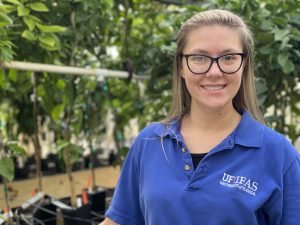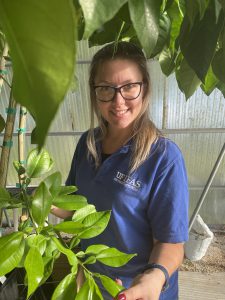FORT PIERCE, Fla.—A scientist with a career invested in Florida citrus production will join the research team from the heart of Florida’s renowned grapefruit production region.

A native of Brazil’s famous citrus production region, São Paulo State, Flavia Zambon is the selected candidate for the UF/IFAS Indian River Research and Education Center’s (IRREC) assistant professor of production horticulture of citrus and other tree crops. The center is in the Indian River District, a central-east coastal stretch from Mims in Brevard County to north Palm Beach County, known for its peerless grapefruit exported to points as far away as Southeast Asia.
Many years experience with Florida citrus production
In announcing Zambon’s new IRREC appointment, to begin in November, Ronald D. Cave, IRREC director, said Zambon is the strongest candidate for the position owing to her many years of experience with citrus research in all of Florida’s citrus production regions.
Multi-Agency Coordination, or MAC project leadership
The experience came from her graduate research and a 3-year position as project manager for a Multi-Agency Coordination (MAC) project. The project named “Evaluation of Potential HLB Tolerant Grapefruit Rootstock/Scion Combinations in the Indian River District of Florida” is granted by the United States Department of Agriculture, Animal, and Plant Health Inspection Service. HLB is the acronym for huanglongbing or citrus greening, a bacterial disease that has devastated citrus production in Florida and worldwide. Additional agencies collaborating with the project include The Indian River Citrus League and the Division of Plant Industry with the Florida Department of Agriculture and Consumer Services, said Mark Ritenour, Zambon’s former supervisor and IRREC Professor of Horticulture.

Between August 2020 and April 2022, more than 40 experimental blocks were planted, each with 42 grapefruit scion and rootstock combinations that are managed by 16 participant growers. In spring this year, the Citrus Research and Development Foundation began funding continued data collection on these trees. The research is critical as the trees enter their fruit-bearing years, said Ritenour.
Stakeholder relations
“The most compelling point about Dr. Zambon’s selection for the citrus and tree crops position is that she knows the growers in the state’s citrus industry and has built a good relationship with them through her previous employment with IRREC for the MAC project,” Cave said.
One of the growers Zambon has worked closely with is Peter Spyke, an IRREC advisory committee member and a local heritage citrus grower.

“We are very pleased to hear that Dr. Flavia Zambon will fill the horticulturist position at IRREC,” said Spyke. “IRREC is currently involved with two extensive citrus experiments — rootstock trials in the Millennium Block and the grapefruit “MAC” projects, the latter consisting of over 30 different grower field trials.”
Spyke adds that data collection and analysis from the two citrus research projects require serious commitment. The MAC project aim is to identify possible tolerance for HLB with more than 12,000 new tree plantings distributed on 84 acres in groves owned by 16 participating growers.
“Dr. Zambon has been involved with the trials in the past and has repeatedly proven that she will be where she needs to be when she needs to be there,” said Spyke. “We are fortunate to have a scientist who has proven herself in our projects, and I have every confidence that she will continue to provide the leadership necessary to help IRREC continue to be successful in the future.”

Leadership for Millennium Block Field Trial
Zambon will lead a second active experimental field trial, the Millennium Block. The 20-acre experiment comprises more than 5,500 trees developed with rootstocks, or the part of the trees belowground, and different varieties of scions. In its third year, some grapefruit, grapefruit hybrids, orange, and mandarin varieties revealed disease tolerance and intolerance. Cave and Spyke said the experiment must continue for up to seven years to yield data upon which growers may rely.
A third aspect of the IRREC horticultural research program will be with citrus trees under protective screenhouses, also known as CUPS. Trees that can grow inside the CUPS are protected from citrus greening because the invasive psyllid that transmits the disease is excluded. Inside, healthy, high-value grapefruit grows free of citrus greening.
“Upon my return to the University of Florida, I plan to keep the variety trials at the Millennium Block and the former MAC project running,” said Zambon. “Both projects are vital for the industry and our citrus growers, as well as the development of visual disease detection workshops for the fieldworkers.”
As part of her role, concomitantly with the MAC project, Zambon grafted grapefruit and mandarin trees with infected HLB buds and quantified the gene expression before visual symptoms appeared. Trees under attack by citrus greening showed distinct responses to defend themselves from the pathogen. To assess the trees’ conditions and reactions, Zambon said she evaluated ten different genes. The gene expression demonstrated unparalleled energy metabolism and carbohydrate levels inside the leaves, where the disease becomes most notably visible, said Zambon.
“In terms of research, I want to keep exploring the effect of micronutrients in the hormonal profile of citrus and develop alternatives to detect pre-symptomatic trees through carbohydrate partitioning quantification,” said Zambon.
Part of Zambon’s work will include efforts to collaborate statewide with professional growers, research, and Extension faculty to explore alternative crops that could provide economic opportunities in the Indian River production region.
Zambon holds a Ph.D. in Horticultural Sciences from the University of Florida, with field and laboratory research at the UF/IFAS Citrus Research and Education Center in Lake Alfred, Florida. She earned two bachelor’s degrees: the first in agronomic engineering, and a second, in agriculture, both from the University of São Paulo Luiz de Queiroz, College of Agriculture, in Brazil. Zambon is fluent in Portuguese, Spanish, and English languages.
A short movie that honored Dr. Zambon on National Postdoctoral Day, 2022. In this video, Dr. Zambon presents her work with the MAC Project.
 13
13
